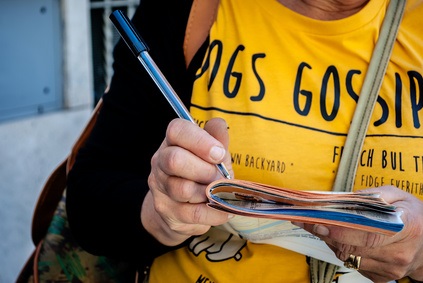Regularly practicing your skills will help you to get better at orienteering. Skills games can also be a great way to stay active and involved if you do not have the time or resources available to be able to run a full course.
Skills games are also a very varied way of taking part in the sport. They can help you to work on one particular skill, or they can develop a range of different skills in one. There are a lot of basic games for beginners, but there are also plenty of games for people who already go orienteering regularly. Here are a few examples of games that you can try.
Symbol Relay
This game is designed to help beginners to learn the symbols which are used on orienteering maps. For this game you will need 2 or more teams. For each team you will need to create two boxes which each include one set of flashcards. One set will have a series of flashcards showing all of the main orienteering symbols, whilst the other set will have a series of flashcards with single words on which represent what each symbol means. Set each team up an equal distance away from the box.
To begin the race, the first team member must run to the boxes and pick out one flashcard from the symbols box. That team member should then run back to the team and show the flashcard to the next player. The second player must then run to the second box and find the word which corresponds with the symbol that they were give. They should then run back to the team and the cycle begins again. The first team to match all of their symbols is the winner.
Pitch Orienteering
Pitch Orienteering is designed to help people to work on their speed and movement skills, as well as helping them to keep their minds focused on their own race without being distracted by others. This game takes place on a football pitch and can be done indoors or outdoors.
Sixteen numbered cones are set up around the football pitch. The numbers should not be consecutive or in any pattern or order. A large selection of maps are created which take in a set number of cones (8 or 9 is a good number to choose).
Participants are divided into teams and each team is given a set of maps in a different order. The first participant in each group takes the first map in their series and sets off around their course. They must get the number from each cone that they visit and add these up. Once they return to base, they must give the adjudicator the correct number before the next member of the team is allowed to set off on their map. The first team to correctly complete all of their courses is the winning team.
Individual or Team Score
Score races give participants the opportunity to practice route planning, and knowing how to play to their strengths. In score orienteering, planning a good route is usually more important than general ground speed. Score races are sometimes considered to be another orienteering discipline, rather than a type of practice game.
An orienteering area is set out in the standard way; however each control is ascribed a specific point value. Higher points values can be placed in harder to visit locations. Participants are given a map which shows the location of all of the controls and shows how many points each control is worth. All participants are given a set amount of time in which to score as many points as possible. It will not normally be enough time to visit all of the controls, so participants must consider which controls they can visit in the allocated time. Most participants will be faced with the choice between pushing for a few high value controls, and trying to visit a higher number of lower value controls.
To add an extra dimension to score races, some controls may be given a negative score value. This helps to prevent participants from running round and visiting every control point that they spot. The threat of negative points can help to improve participant awareness of where they are on the map. Negative point value controls are particularly useful if you are running the race in a smaller area.
Many clubs run training games to help newcomers, as well as games to hone the skills of seasoned participants. If you need any advice on finding your local orienteering club or finding a newcomers event, then you should get in contact with British Orienteering. The organisation will be able to provide you with details about anything that is going on in your local area.

Leave a Reply